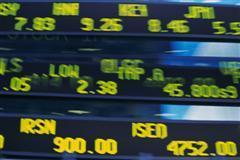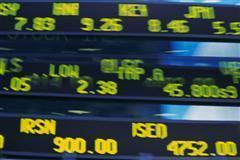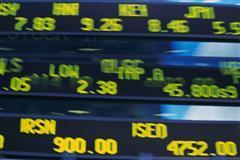| Home | About | Archives | RSS Feed |

@theMarket: Stop Worrying About Inflation
 Here is a sampling of comments I received this week from Berkshire clients:
Here is a sampling of comments I received this week from Berkshire clients:
"Just wait until higher prices start hiking the inflation rate."
"Interest rates are rising because of inflation."
"Look at the government deficit disaster, the only thing we can do is inflate our way out of debt."
It is as if everyone in the United States is absolutely convinced that we are on the verge of hyperinflation. And yet the inflation rate remains below the Federal Reserve's target of what is considered a healthy rate of inflation. It's time I cut through the hyperbole and set things straight for you and I.
I believe that until the unemployment rate drops substantially, inflation in the U.S. will be contained to no more than 2 or 3 percent.
In the meantime, in order for the housing market, the banking sector, the nation's unemployed and the economy overall to improve, we need to spend more money and ignore the deficit for now. The Fed has it right. Drown the system with dollars until even the most recalcitrant lender has no choice but to lend despite the perceived risk.
Commodity prices are rising because of 1) terrible weather and 2) economic recovery worldwide. Those price increases may or may not be inflationary depending upon where you live and do business. Additional demand for wallboard by a local builder, for example, is a good thing because there is a lot of excess capacity right now in the U.S. The same is not true for Chinese or Indian builders, who are populating their country's skylines with thousands of new buildings. For them, higher prices for every additional nail, two-by-four or steel girder fuel their already high inflation rates.
Quantitative easing has been judged a failure by a host of economists and strategists because it has caused interest rates to rise and asset prices to increase, but those are positive developments in my opinion. The price rise in assets (capital goods) is why big takeover deals are back. The impetus behind "merger mania" is simple: investors' expectations have changed drastically from last year's "double dip" mentality. Both market participants and corporations now believe that the return on investments over the coming years will be far higher than expected so assets are worth more now; thus the price increase. That's why investors are loving the increasing stream of takeovers and mergers. These asset price increases will lead to a surge in economic activity and ultimately increases in employment.
The rise in interest rates does not indicate inflation fears. They are simply reflecting the new reality that real returns on assets are increasing. In order to stay competitive, the bond market must offer higher rates. So don't be spooked by higher rates. Their increase is a natural, predictable and welcome development in any country's economic recovery. Don't let the talking heads tell you otherwise.
Expect the dollar to continue to weaken. Very few countries outside of the U.S. have any form of QE I, II. As a result, other countries' currencies will strengthen against the greenback as their interest rates rise much higher than our own. As I've written before, this is good for our exports because a cheaper dollar increases demand for "Made in America" products. Witness this week's take over of the New York Stock Exchange by the Germans.
As for the stock market, contrary to everyone's expectations of an impending correction, the averages continue to confound to the upside. I say expect a correction, but don't wait for it. We have considerable upside ahead of us. Stay the course and stay invested regardless of any pending pullbacks.
Bill Schmick is an independent investor with Berkshire Money Management. (See "About" for more information.) None of the information presented in any of these articles is intended to be and should not be construed as an endorsement of BMM or a solicitation to become a client of BMM. The reader should not assume that any strategies, or specific investments discussed are employed, bought, sold or held by BMM. Direct your inquiries to Bill at 1-888-232-6072 (toll free) or e-mail him at wschmick@fairpoint.net. Visit www.afewdollarsmore.com for more of Bill's insights.
| Tags: inflation, QE |
Independent Investor: Are Dividend Stocks a Good Investment?
 Dividend stocks have outperformed nondividend paying stocks since 1972. However, the companies that had provided the best track records in paying and increasing their dividends have either been acquired, stopped raising dividends or in some cases even eliminated them. Given that a large number of baby boomers are set to retire in the next few years with definite income needs, I believe that the demand and supply of dividend paying stocks will only increase.
Dividend stocks have outperformed nondividend paying stocks since 1972. However, the companies that had provided the best track records in paying and increasing their dividends have either been acquired, stopped raising dividends or in some cases even eliminated them. Given that a large number of baby boomers are set to retire in the next few years with definite income needs, I believe that the demand and supply of dividend paying stocks will only increase.
But the last few years of turmoil have shaken the confidence of many dividend believers. In the S&P 500 Index about 370 stocks pay dividends at any given time. In 2009, those dividends declined by 20 percent. That's on top of a 35 percent sell-off in stock prices in 2008. For those dividend investors living on the income generated from their portfolios, this double whammy was devastating.
A great many investors finally threw in the towel, sold out and moved to the sidelines in the beginning of 2009. In hindsight, that was the wrong move. Even today a lot of those investors have not re-entered the market.
Although dividends gained back 5 percent last year, they are still 17 percent below the level companies paid in 2008. Some pundits believe that it will take until 2013 before dividends are back to the 2008 level. That may be true for some companies but not all companies are the same
For example, the 70 companies with the highest annual dividend growth rate over the past three years have outperformed 58 percent of all stocks in the S&P. They are predominantly mature businesses that have strong cash flows, stable profit outlooks and lower operational risk, on average, than other companies. In my opinion, if an investor does his due diligence on a targeted list of companies, he or she can be rewarded with both additional yield as well as some price protection. But the devil is always in the details.
Recently a reader asked if dividend payers perform well in an inflationary economy; evidence indicates they do.
In the period 1974-1980, when the inflation rate was 9.3 percent, the return on the S&P index averaged 9.9 percent a year. The dividend component of this return (4.9 percent) accounted for nearly half of the overall return. Obviously, if things go the other way (a deflationary environment), dividend payers shine because they are, by definition, defensive and provide a stream of income.
I believe we are in an economic recovery. Economic and earnings cycles typically encourage and support accelerating dividend growth and this recovery should be no different. In addition, many companies hold a record amount of their net worth in cash due to the peculiar nature of this last recession. I believe managements will use that cash to increase dividends and/or buyback stock.
This is where your due diligence comes in. If you did your homework, you would discover that just 10 stocks account for 32 percent of the cash (ex financial companies) in the S&P 500. Those 10 stocks receive an average of 56 percent of their sales from outside the U.S.
If you further believe that the dollar will continue to decline and that some overseas markets will grow at a faster clip than the U.S., then it makes sense to look at those 10 in relation to how much dividends they generate.
That is not the only criteria an investor should use in selecting dividend stocks. Free cash flow coupled with strong earnings growth, low debt to equity, a track record of increasing dividends over at least 5, if not 10 years, are just some of the variables investors should use to fashion a high-quality dividend portfolio.
Unfortunately, many investors simply look for the highest-yielding securities they can find. That only works in a bull market. At the first sign of problems, those yields evaporate along with the price of the stock. That brings up the final issue. How to invest in dividend stocks in today's markets?
Readers are aware that I am not an advocate of the buy-and-hold investment philosophy. I believe firmly that we are in a long-term bear market that could last for another 5 or 6 years. Right now we happen to be enjoying a rally that could continue for another 6 months to a year, but at some point it will end. Therefore the investor must mange risk and no longer depend on just the dividend to cushion declines in his portfolio. You might, for example, establish a rule that a company that cuts its dividend is an automatic sell or begin to liquidate stocks once the S&P 500 index breaks its 200 day moving average. The point is that you must manage your portfolio actively, which requires a lot of work.
Another highly recommended alternative is to hedge your portfolio with covered options. The cost of that protection will reduce your overall returns but you will sleep better at night knowing that if we revisit the declines of 2008-2009 your portfolio will at least be protected from price declines. Bottom line: dividend stocks do have a place in your portfolio, if you are willing to work for it.
Bill Schmick is an independent investor with Berkshire Money Management. (See "About" for more information.) None of the information presented in any of these articles is intended to be and should not be construed as an endorsement of BMM or a solicitation to become a client of BMM. The reader should not assume that any strategies, or specific investments discussed are employed, bought, sold or held by BMM. Direct your inquiries to Bill at 1-888-232-6072 (toll free) or e-mail him at wschmick@fairpoint.net. Visit www.afewdollarsmore.com for more of Bill's insights.
| Tags: dividends |
@theMarket: 9 Percent Unemployment, Can 8 Percent Be Far Behind?
 Sure, I'm jumping the gun a little, but I suspect in the weeks ahead economists will begin forecasting a percentage point drop in joblessness by the end of this year. Granted, that number is nothing to celebrate, but at least it is moving in the right direction.
Sure, I'm jumping the gun a little, but I suspect in the weeks ahead economists will begin forecasting a percentage point drop in joblessness by the end of this year. Granted, that number is nothing to celebrate, but at least it is moving in the right direction.
For investors, however, that slow decline in unemployment does have a silver lining. You can count on the Federal Reserve to keep short-term rates at historic lows and keep QE II going until hiring accelerates. That means stock prices are going higher and Treasury bonds lower.
As I wrote last week, the conflict in Egypt is a sideshow, although it did get gold and silver off their proverbial backs. Dusting off my technical charts, I believe a bottom in gold at $1,300 a ounce or there about is reasonable. We almost hit that level ($1,318 a ounce) a week ago.
Silver also dropped to the $26.50 range and has risen every day since then. From the price action, it appears that the corrective phase of precious metals is just about over. Buyers take note that oftentimes, commodities will tend to re-test their lows; so if you are buying here save a little cash in the event these metals re-test.
Egypt has also caused oil to spike to my price target of $100/bbl.Six of the world’s ten most-used oil markers are now in triple digits. Crude oil futures for March delivery, the marker most often used in the U.S. media is still "only" $89-$90 a barrel so we still have a little room on the upside before I become cautious on oil in the short term.
Last quarter's earnings season is winding down and once again there were more beats than misses. The latest batch of economic numbers (if sustainable, and I think they are) indicates that the present quarter should see an acceleration in earnings overall. U.S. chain store sales jumped 4.2 percent in January, despite the horrendous weather. The auto manufacturers are generating such strong profits (a 17 percent rise in January) that suppliers, lenders and dealerships are beginning to feel new life in their own financial performance after a two year hiatus. That trickle-down effect should impact America's Main Street very soon.
On the global front, it's a similar picture with 15 of 24 of the world's major economies registering a surge in manufacturing. Factories throughout the U.S., Asia and Europe are experiencing growth, but it is also leading to higher commodity prices and therefore inflation. China and other developing countries have complained that U.S. policies (specifically the $600 billion QEII) are the root cause of these price increases. Federal Reserve Chairman Ben Bernanke denies that and instead blames any inflationary pressures on the runaway growth among emerging market economies.
Bottom line: every country in the world is playing the emerging market game, exporting their way back to prosperity. Those countries that have traditionally had that field to themselves suddenly find themselves in competition with the big boys. They can bluster, complain, even make veiled threats, but given the realities, they need us as much as we need them.
We had another big week in the markets as the averages rebounded from the Egypt scare, although all of the gains came on Monday and Tuesday. This year seems to be shaping up like the last, where most of each month's gains occurred on the first day or two of the month. In 2010, Mondays were especially kind to investors, but we will have to see if that trend persists again this year.
I'm bullish, although readers should expect pull backs at any time. Some of them may be quite hefty but that won't derail what I see as a continued upward bias in all the averages with industrials, commodities and technology leading the pack for now.
Bill Schmick is an independent investor with Berkshire Money Management. (See "About" for more information.) None of the information presented in any of these articles is intended to be and should not be construed as an endorsement of BMM or a solicitation to become a client of BMM. The reader should not assume that any strategies, or specific investments discussed are employed, bought, sold or held by BMM. Direct your inquiries to Bill at 1-888-232-6072 (toll free) or e-mail him at wschmick@fairpoint.net. Visit www.afewdollarsmore.com for more of Bill's insights.
| Tags: metals, manufacturing, exports, Egypt |
@theMarket: Commodities and Emerging Markets
 It has been a given that where commodities go, so go emerging markets; however, that correlation seems to have broken down over the last few months. While commodities, both precious and base, have continued to rise, emerging markets have underperformed since November. What gives?
It has been a given that where commodities go, so go emerging markets; however, that correlation seems to have broken down over the last few months. While commodities, both precious and base, have continued to rise, emerging markets have underperformed since November. What gives?
For several years the basic investment thesis is that emerging markets are economic juggernauts with an insatiable demand for the world's natural resources. Their factories devour every form of commodity and transform them into the world’s textiles, steel, clothes, cars, toys, electronics and scores of other exports.
But sometimes you can come up against too much of a good thing. That is what is happening to several of the larger emerging market countries such as China, Brazil and India. All three countries managed to avoid global recession. While we languished with high unemployment and negative growth, most emerging markets continued to grow and grow and grow. As a result, their domestic economies are beginning to overheat.
As they do, their inflation rates are starting to rise to uncomfortable levels with serious consequences for their economic future. China, for example, grew 9.8 percent in the fourth quarter while registering a 4.6 percent inflation rate. This week, Brazil announced that consumer prices in there rose to nearly 6 percent.
The governments of these countries have responded by raising interest rates and tightening credit conditions. The Brazilian Central Bank hiked interest rates by one half percent to 11.25 percent on Thursday and observers expect another hike very soon.
Local investors, drunk on ever-higher stock prices in 2010, are decidedly miffed that their central banks are taking away the punch bowl this year. China's stock market has declined over 15 percent since November. Brazil and India have also underperformed the U.S. markets as well.
In the meantime, commodity prices have largely ignored this new reality until very recently. Brazil's sudden rate hike, in combination with China's higher reading on domestic inflation this week, have finally shaken some of the euphoria out of the commodity market. We need this pullback (and I hope it continues) in order to square prices with reality in the emerging markets
I believe the declines in emerging stock markets are coming to an end. I would be a buyer of those markets on further pullbacks, because I still believe that regardless of any further short-term actions to slow growth, their economies will still outgrow more developed markets this year, next year, and the years after that. Commodities are also a great place to invest once this pullback is over. I advise that you wait for some price stability before adding to positions.
As for the U.S. stock markets, it appears that just about everyone is now in the "too extended, probable sell-off" camp that we have been waiting for over the last few weeks. The contrarian in me doesn’t like to see the consensus come over to my point of view because the stock market often does what is most inconvenient to the greatest number of people.
Nonetheless, I would love to see a 3 to 5 percent correction before the end of the month. It would give me the opportunity to put more money to work. For specific recommendations, call or e-mail me.
Bill Schmick is an independent investor with Berkshire Money Management. (See "About" for more information.) None of the information presented in any of these articles is intended to be and should not be construed as an endorsement of BMM or a solicitation to become a client of BMM. The reader should not assume that any strategies, or specific investments discussed are employed, bought, sold or held by BMM. Direct your inquiries to Bill at 1-888-232-6072 (toll free) or e-mail him at wschmick@fairpoint.net. Visit www.afewdollarsmore.com for more of Bill's insights.
| Tags: commodities, emerging markets |
The Independent Investor: Why Baby Boomers Are Grumpy
 You would think those born between 1946 and 1965 would have a lot to be thankful for. After all, the first wave of those baby boomers is finally eligible to retire in 2011. The recession appears to be over and jobs are beginning to make a comeback, even the stock market is performing well — so what's the problem?
You would think those born between 1946 and 1965 would have a lot to be thankful for. After all, the first wave of those baby boomers is finally eligible to retire in 2011. The recession appears to be over and jobs are beginning to make a comeback, even the stock market is performing well — so what's the problem?
The Pew Research Center's recent survey on baby boomers indicates that fully 80 percent are "dissatisfied with the way things are going in the country today."
Quite a bit of that unhappiness can be traced to personal finances and negative economic views. That makes sense since boomers were hit harder than most segments of the population by the double whammy of declining stock prices and housing prices. For those laid off who are older than 50 years of age, it has been harder to obtain a new job. And even those who are employed argue that real income has stagnated over the last decade. As a result, the majority say their household finances have worsened and a higher portion of boomers than other ages have had to cut spending this year.
The current estimate of baby boomers in America is 79 million, about 26 percent of the total U.S. population. Although they still consider retirement age at 65, the typical boomer believes that old age doesn't begin until age 72, according to the survey.
Times have changed since the boomers came of age in the '60s and '70s. Back then, America was the land of honey and horizons seemed to stretch forever. Now, most boomers point to the huge national debt, the deficit, a lack of political leadership and lament that America is past its prime. They and their country are in decline, or so the story goes.
"My parents worked hard, saved, retired and enjoyed their golden years," said one disgruntled boomer, (who gave me the idea for this column).
"Why can't I do the same?"
Actually, there are a number of reasons why this time around it is different and most of the fault lies with us Boomers. Back in the day, our parents were part of a pension plan that included monthly retirement savings on the company's tab. My Dad was a machinist at SKF (a ball-bearing manufacturer) for 30 years and worked another full-time job at night. The pension contributions increased as his salary rose and as the number of years worked at the company increased. His pension was conservatively managed by trained professionals. It was also fairly easy to calculate the money he would be receiving on the first day of retirement and my parents planned for that.
Their mortgage was fixed and ended right around the time of retirement. Your parents also knew how and what their medical plan would be in retirement as well as Social Security benefits. Most costs were controlled, or at least somewhat contained while families lived frugally and spurned debt. Some did so successfully and enjoyed those golden years, others (like my Dad who died of a massive heart attack a few years after retiring) didn't do so well, but at least the results were fairly predictable.
We baby boomers wanted more.
We did away with pensions and took control of our own retirement in the form of deferred-retirement plans like 401(k)s and IRAs. The problem was that contributing to those plans was voluntary (unlike pension plans). And somehow there was always something more important to spend our money on. Besides it was much more fun to "flip houses and make a killing" than make those monthly contributions toward retirement.
Even those who did save only kinda sorta did it. Self-directed, deferred-retirement plans should have done exceptionally well in the period from 1982 to 2000. It was the greatest bull market in recorded history, but few actually put enough money in these plans to make a difference. By 2001, when some of us actually began saving more, we watched those savings first disappear during the Dot-Com bust and then again more recently in 2008-2009. As a result, retirement plans actually went nowhere in the last decade.
As if that wasn't a low enough blow, those of us who counted on our houses to bail us out — the "I can always sell my house" crowd — witnessed that store of wealth decline 30 percent in the last two years. Houses are not moving, or if they are, sellers are forced to take a cut depending upon the size and location of your home. For someone forced to sell, faced with the prospect of living on social security with insufficient retirement savings, there is definitely something askew with the American Dream. It is no wonder that Boomers are grumbling. Many feel their country’s economic prowess has peaked and the promise of prosperity for all has been broken. Living the dream for many has turned into living a nightmare.
Maybe it was that old long-haired hippie in us that whispered we would live forever so why worry about retirement, or if we really had to, we could get by living in our old VW bus. It is only now that those romanticized notions are disappearing in the face of reality. But it is not too late. Maybe you can't retire at 65 but that may turn out to be a good thing. You can always start saving, and if I am right about the stock market this year, even first-time investors could make a substantial return on their money.
This country still holds promise for those willing to grasp it. No one is ever too old for that.
Bill Schmick is an independent investor with Berkshire Money Management. (See "About" for more information.) None of the information presented in any of these articles is intended to be and should not be construed as an endorsement of BMM or a solicitation to become a client of BMM. The reader should not assume that any strategies, or specific investments discussed are employed, bought, sold or held by BMM. Direct your inquiries to Bill at 1-888-232-6072 (toll free) or e-mail him at wschmick@fairpoint.net. Visit www.afewdollarsmore.com for more of Bill's insights.
| Tags: baby boomers, pensions, retirement |

